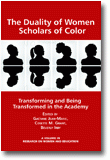
The Duality of Women Scholars of Color
Transforming and Being Transformed in the Academy
Edited by:
Gaëtane Jean-Marie, University of Oklahoma
Cosette M. Grant, University of Cincinnati
Beverly Irby, Texas A&M University
A volume in the series: Research on Women and Education. Editor(s): Beverly Irby, Texas A&M University. Julia Ballenger, Texas A&M University, Commerce.
Published 2014
The seven chapters address long-standing concerns from first-hand perspectives regarding women of color faculty in the academy, the marginalization of women of color scholars in the academy and the benefits of mentoring support. Discussion of such are threaded throughout this book. Mentoring has been a practice of leadership since Greek times, and research has documented the advantages of mentoring. Aligned with the authors espoused mentoring perspectives in this book, is the coined concept of “synergistic mentoring” Accordingly, “Synergistic mentoring is defined as a mentor and mentee working together collaboratively to (a) generate a greater good for both, (b) integrate diverse perspectives into the context, and (c) construct together an otherwise unattainable goal attempted independently.
The authors of this book seek to enlighten, dynamic and critical discussions by and about women of color in the academy. Conceivably the most intriguing part of each chapter is the methodological approaches used to address race, gender, and social justice in the academy. Qualitative methods dominate the chapters with effective use of personal narratives and the lived experiences of the participants. The voices of those often ignored or forgotten are examined building on the legacy of women of color in the academy who paved the way for this generation and future scholars of color. Moreover, the chapters presented herein challenge assumptions, perspectives and beliefs about the significance of women of color scholars in the academy. They are provocative and provide direction for future research that advance knowledge and understanding for a better society based on social justice, equity and equal opportunity. They also give voice to both the shared diverse and common experiences of this group of women scholars of color and provide useful guidance and new perspectives on transforming the world’s academics into more inclusive and equitable environments around the globe (Thomas & Hollenshead, 2001). Ultimately, outcomes from these collections of scholarly discourse, may have important implications for effective policy and program practice that raise important questions about institutional commitments that advocate for the advancement of women of color in the academy.
CONTENTS
Acknowledgments. Introduction: Historical and Contemporary Milieu on Women of Color Scholars in the Academy, Cosette M. Grant, Gaetane Jean-Marie, and Beverly Irby. From Chair to Podium: A Narrative Experience of an African American Female Emerging Scholar’s Entry Into the Academy, Cosette M. Grant. Navigating the Academy: Exploring Barriers and Possibilities in Scholarship Through the Lens of an American Indian Scholar, Hollie Mackey. Call, Natalie A. Tran. Transcending “Other” by Building Bridges in Pursuit of Social Justice: Experience of a Caribbean Female Faculty in the Academy, Gaëtane Jean-Marie. Interrupting the Usual in the Academy: Creating a Sense of Belonging Among Latina Faculty, AnneMarie Nuñez, Elizabeth Murakami-Ramalho, and Elsa Ruiz. Grace at the Top: A Black Feminist Perspective on Critical Leadership in the Academy, Lorri Johnson Santamaría. Remaining Connected to the Sociocultural Experiences of Underserved Populations: Volunteering and Advocacy in Research and Practice in the Academy, Brenda Lloyd-Jones. About the Authors.
REVIEWS
"Women of Color considering the professoriate will find this book a very practical guide with empirically supported techniques for approach, entry into, and survival in the academy. Some of the authors provided insight into the unspoken expectations of institutions of higher education. They did this by indicating that there is considerable research on barriers to retention and promotion of Women of Color, but they remained focused on what works to move over, around, and beyond those barriers." Martha E. Banks ABackans DCP, Inc. in PsycCRITIQUES
-
Paperback9781623965020
Web price: $45.04 (Reg. 52.99)
-
Hardcover9781623965037
Web price: $80.74 (Reg. 94.99)
- eBook9781623965044

- EDU016000 - EDUCATION: History
- EDU020000 - EDUCATION: Multicultural Education
- EDU015000 - EDUCATION: Higher
-
 Girls and Women in STEM
A Never Ending Story
Girls and Women in STEM
A Never Ending Story
-
 Girls and Women of Color In STEM
Their Journeys in Higher Education
Girls and Women of Color In STEM
Their Journeys in Higher Education
-
 Girls and Women of Color In STEM
Navigating the Double Bind in K-12 Education
Girls and Women of Color In STEM
Navigating the Double Bind in K-12 Education
-
 Leading from a Feminist Soul
Leading from a Feminist Soul
-
 Women Leaders
Advancing Careers
Women Leaders
Advancing Careers
-
 Women of Color In STEM
Navigating the Double Bind in Higher Education
Women of Color In STEM
Navigating the Double Bind in Higher Education
-
 Women of Color in STEM
Navigating the Workforce
Women of Color in STEM
Navigating the Workforce

